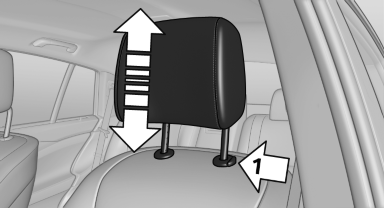Front head restraints
Correctly adjusted head restraint
A correctly adjusted head restraint reduces the risk of injury to cervical vertebrae in the event of an accident.
![]() Adjusting the head restraint
Adjusting the head restraint
Correctly adjust the head restraints of all
occupied seats; otherwise, there is an increased
risk of injury in an accident.◄
Height
Adjust the head restraint so that its center is approximately at ear level.
Distance
Adjust the distance so that the head restraint is as close as possible to the back of the head.
If necessary, adjust the distance by adjusting the tilt of the backrest.
Active head restraint
In the event of a rear-end collision with a certain severity, the active head restraint automatically reduces the distance from the head.
![]() Reduced protective function
Reduced protective function
► Do not use seat or head restraint covers.
► Do not hang objects, e.g., clothes hangers,
on the head restraints.
► Only attach accessories approved by BMW
to the seat or head restraint.
Otherwise, the protective function of the active
head restraint will be impaired and the personal
safety of the occupants will be endangered.◄
Adjusting the height

► To raise: pull.
► To lower: press the button, arrow 1, and
push the head restraint down.
Removing
The head restraints cannot be removed.
See also:
Address book
To create contacts.
Selecting a destination from the address book
1. "Navigation"
2. "Address book"
Contacts with addresses are displayed if these addresses have be ...
RDS
RDS broadcasts additional information, such as
the station name, in the FM wave band. When
playing a station with multiple frequencies, the
system automatically switches to the frequency
with ...
Individual protection at every seat
The exemplary crash responses of the new BMW 3-Series Sedan body also provide
the best possible basis for the optimum design and set-up of the car's restraint
systems. The sports sedan is equipped ...
